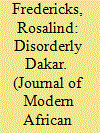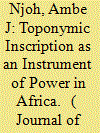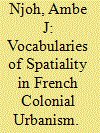|
|
|
Sort Order |
|
|
|
Items / Page
|
|
|
|
|
|
|
| Srl | Item |
| 1 |
ID:
122787


|
|
|
|
|
| Publication |
2013.
|
| Summary/Abstract |
During the era of President Abdoulaye Wade, a household waste crisis periodically held the streets of Dakar in its noxious grip. This paper analyses the crisis in light of waste management's role as a fundamental urban public service, key employment sector, and visceral symbol of the city's management. It examines how the institutional landscape of waste management took centre stage in a power struggle within the state that centred on reconfiguring the labour of ordering the city. At the same time, it reveals how the waste-workers' union emerged as one of the most visible and savvy labour movements in contemporary Senegal. Through the creative disorder unleashed by intentional acts of dirtying, workers and residents alike forged new claims to the city. Conclusions are drawn for the wider implications of the disorderly city for the urban question in Dakar and the landscape of citizenship in Senegal's contemporary period.
|
|
|
|
|
|
|
|
|
|
|
|
|
|
|
|
| 2 |
ID:
148229


|
|
|
|
|
| Summary/Abstract |
This paper discusses the changing socio-cultural landscape at Cheikh Anta Diop University of Dakar (UCAD), Senegal. It shows how the growing influence of the religious phenomenon since the late 1970s has encouraged young students to develop an Islamic activism that tends to replace the revolutionary and secular traditions that had dominated the space since the founding of this Senegalese university in 1957. These transformations, which take the form of a “decomplexification” of religion and of a communitarisation of the academic sphere, are also a reflection of the ongoing transformations in Senegalese society marked by a citizenship in transition. This transition translates itself into a duality between a “national citizenship,” with a francophone and secular character, and a “cultural citizenship,” inspired by Islam and initially driven by an Arab-Islamic elite as it negotiates its place in the public and administrative spheres that have historically been dominated by francophone elites.
|
|
|
|
|
|
|
|
|
|
|
|
|
|
|
|
| 3 |
ID:
147331


|
|
|
|
|
| Summary/Abstract |
This historical essay critically examines the early military settlement projects realized by the French Engineering Corps in Senegal and the Western Sudan during the second half of the 19th century. The French were preoccupied with the establishment of official control over the hinterland, confronting a variety of challenges in situ. In striving to go beyond the prestigious image of the Corps and the discourse on colonial settlement forms as an instrument for domination, this article exposes aspects of uncertainty and haphazardness behind the projects. Visual correspondence with indigenous cultures is expanded, employing a rich variety of historical sources.
|
|
|
|
|
|
|
|
|
|
|
|
|
|
|
|
| 4 |
ID:
157195


|
|
|
|
|
| Summary/Abstract |
This study analyses toponymic inscription, the exercise of street/place naming, as a tool for articulating power in Anglophone and Francophone Africa. The focus is on Dakar, Senegal and Nairobi, Kenya, which were respectively indispensable for the colonial projects of France and Britain in Africa. Dakar was for France’s West African Federation what Nairobi was for Britain’s colonial East Africa. It is shown that toponymic inscription was used with equal zeal by French and British colonial authorities to express power in built space. Thus, both authorities used the occasion to christen streets and places as an opportunity to project Western power in Africa. With the demise of colonialism, indigenous authorities in Kenya inherited the Western vocabulary of spatiality but speedily moved to supplant Eurocentric with Afrocentric street/place-names. In contrast, post-colonial authorities in Senegal remain wedded to the colonial tradition of drawing most important street- and place-names from the Eurocentric cultural lexicon. Consequently, although the vocabulary of spatiality in Nairobi projects African nationalism and power, that of Dakar continues to express mainly Western power.
|
|
|
|
|
|
|
|
|
|
|
|
|
|
|
|
| 5 |
ID:
168250


|
|
|
|
|
| Summary/Abstract |
The study analyses toponymic practices in two colonial spaces on two continents. The colonial spaces, Dakar and Saigon, were capitals of the Federation of French West Africa and French Indochina, respectively. Toponymy is used as a tool to articulate socio-cultural and political power in both spaces; also, streets were christened after French military, politico-administrative and religious personalities. Two differences are noted. First, streets in colonial Saigon were named after French military heroes and clergymen, while streets in Dakar were named after French political luminaries. Second, post-colonial Saigon witnessed efforts to re-appropriate the city’s identity, but not so in Dakar.
|
|
|
|
|
|
|
|
|
|
|
|
|
|
|
|
|
|
|
|
|